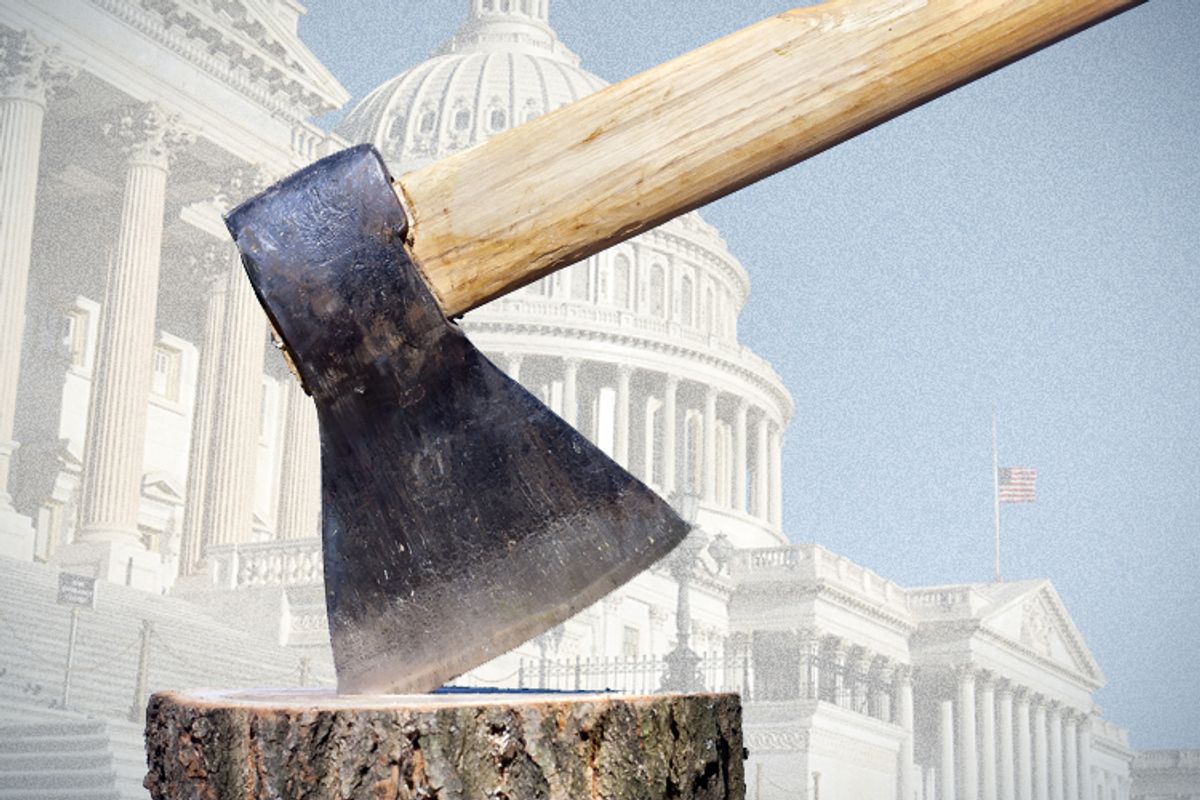In his State of the Union address, President Obama did a little mansplaining about looming budget cuts -- “known here in Washington as ‘the sequester,’” he explained, adding that it is a “really bad idea." It may have sounded a bit condescending, but a recent poll showed that only 36 percent of Americans know what the sequester is.
We’re sure you're firmly in that 36 percent, but even political junkies may not know exactly what the cuts will do to everyday Americans. With just two weeks to go before the sequester goes into effect, negotiations are being put on the front burner, with President Obama leading a press conference this morning to demand action.
Here’s everything you need to know about what the sequester will do it if it's allowed to happen.
First of all, what is the sequester?
A package of $1.2 billion in spending cuts created by the Budget Control Act of 2011, scheduled to go into effect on March 1 . The cuts were meant to act like a loaded gun that Congress put to its own head in order to incentivize themselves to work together on a better deficit reduction program. They failed, and the cuts were triggered on Jan. 1, but Congress pushed back the deadline by a few months when it raised the debt ceiling on New Year's Eve.
A bit on etymology: The word “sequestration” comes from the legal term for when a court seizes property in dispute, and was first used in the budget sense in the Gramm-Rudman-Hollings Deficit Reduction Act of 1985. As any Republican lawmaker will tweet at you, the idea to employ the trigger technique first came from the Obama White House during negotiation over the BCA. Technically, “sequestration” is the noun and “sequester” is the verb, but they’re generally used interchangeably.
What does the sequestration do?
Cut almost everything. It’s an intentionally blunt instrument that slashes spending across the board through 2021, by about 5 percent for nondefense programs and roughly 8 percent for defense programs. There are a few key exceptions: Social Security, Medicaid and war spending. Medicare providers will see a 2 percent cut.
That doesn't sound like a lot. Why does Obama say sequestration is a “really bad idea”?
Because it is, and pretty much everyone agrees on that -- it was designed to be a terrible idea, after all -- and yet it still may very well happen because, well, welcome to Washington. That said, some liberals like the defense cuts, while some deficit-minded Republicans are more amenable to the whole package.
What does sequestration do to the military?
The Pentagon’s base budget would fall to $491 billion for 2013, down from $554 billion last year, which represents the first actual defense cut in almost two decades. After that, defense spending will be tied to inflation, would would save about $500 billion over a decade. The Pentagon has already said it will halt deployment of an aircraft carrier and suggested that troops would receive a smaller pay increase next year. Plenty of other weapons programs are also on the chopping block.
What does it to do the rest of the government?
It’s not pretty. According to Danny Werfel of the Office of Management and Budget, which is tasked with putting the cuts into effect, sequestration would “cause very significant disruptions that would be felt far and wide across the country.” Werfel detailed the cuts earlier this month:
-- 70,000 children would be kicked off the Head Start program, 10,000 teacher jobs would be “put at risk,” and funding for up to 7,200 special education teachers, aides, and staff could be cut.
-- Small business loan guarantees slashed by up to $540 million.
-- Up to 2,100 fewer food safety inspectors.
-- Up to 373,000 “seriously mentally ill adults and seriously emotionally disturbed children could go untreated,” thanks to cuts in the Mental Health Block Grant program.
-- More than 1,000 fewer federal law enforcement agents.
-- About 1,000 fewer federal criminal cases due to prosecutor furloughs.
-- FEMA may have to eliminate grants that support state and local emergency management personnel and local firefighters.
-- Just in time for tax season, IRS customer service agents would be furloughed, resulting in the “inability of millions of taxpayers to get answers from IRS call centers and taxpayer assistance centers.”
-- $130 million would be cut to support tribal health services, law enforcement, education and economic development.
-- 1,200 fewer Occupational Safety and Health Administration (OSHA) workplace safety inspectors.
-- About 600,000 women and children would be dropped from the Nutrition Program for Women, Infants, and Children (WIC).
-- Approximately 125,000 families would be “at immediate risk of losing their permanent housing” thanks to cuts to the Department of Housing and Urban Development’s rental assistance program.
-- Cuts to programs to combat homeless would displace 100,000 formerly homeless people from shelters and other facilities.
-- 7,400 HIV positive patients would lose access care provided by the AIDS Drug Assistance Program.
-- The National Science Foundation would issue nearly 1,000 fewer research grants, impacting up to 12,000 scientists, while the National Institutes of Health would have to "delay or halt vital scientific projects and make hundreds of fewer research awards."
Whoa.
Seriously. The Congressional Budget Office says sequestration could kill 750,000 jobs in 2013 alone and plunge the economy back into recession, contracting GDP by 1.3 percent in the following six months.
What can be done to stop it?
Both sides have put forward proposals along the lines of what you might expect. Democrats have targeted tax loopholes on top of less painful spending cuts, while Republicans have tried to spare the military.



Shares